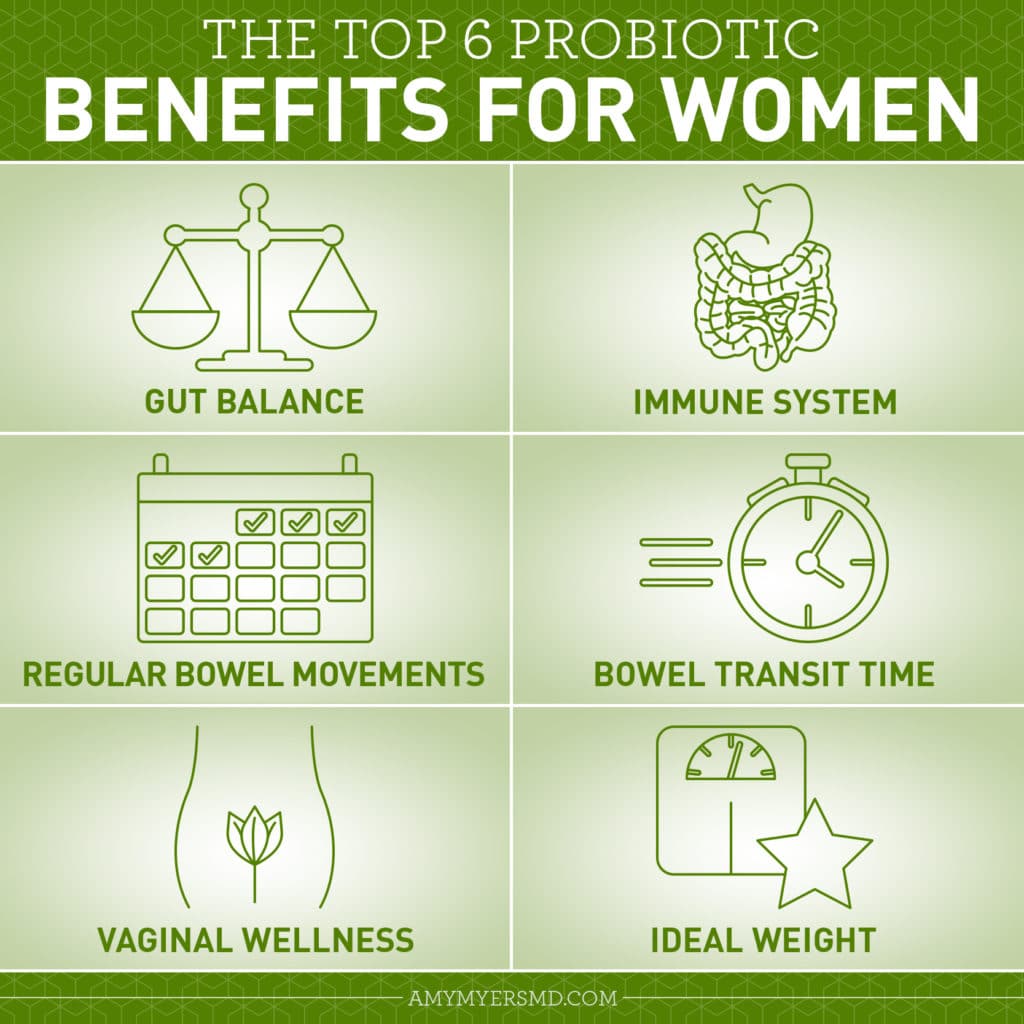Probiotics can support your health in so many areas, from heart health to mental health, allergies, and eczema. However, there is a wealth of probiotic benefits for women. From vaginal health to weight management and healthy bowel function, probiotics are one of the four essential supplements that I recommend everyone takes daily. I truly do believe the best probiotics for women is either a 30 billion colony-forming units (CFUs) that’s ideal for maintenance or a 100 Billion (CFUs), which is what I recommend for recovery.
What Are Probiotics?
Probiotics are living microorganisms that can work in your gut to support your body in a number of ways. They can be found in dietary supplements and fermented foods, as well as within the natural microbiome of your body.1 In fact, you actually have more bacteria in your body than you do your own human cells!2
A healthy microbiome has been linked to the prevention of a wide range of health conditions that often impact women, including urinary tract infections, Candida overgrowth, SIBO, ulcerative colitis, irritable bowel syndrome (IBS), and adult acne.3,4,5
They also have a range of essential jobs to do in your body, including helping you digest food, synthesizing essential vitamins such as the B vitamins thiamine and riboflavin, absorbing water, and fending off dangerous bacteria that can upset your gut microbiome.6,7
Our Top Probiotic Benefits for Women
 Dr. Amy Myers
November 18th, 2019
https://content.amymyersmd.com/article/probiotic-benefits-for-women/The Top 6 Probiotics Benefits for Women – Infographic – Amy Myers MD®
Dr. Amy Myers
November 18th, 2019
https://content.amymyersmd.com/article/probiotic-benefits-for-women/The Top 6 Probiotics Benefits for Women – Infographic – Amy Myers MD®1. Gut Balance
Probiotics can help you maintain the correct balance of gut flora in your body. Everyone’s gut has a mix of good and bad bacteria. The most common examples of good bacteria are Lactobacillus, Bifidobacterium, and Streptococcus.8 There are many types of bad bacteria but among the most common are Staphylococcus, Clostridium perfringens, and Escherichia coli.9
The good bacteria in your microbiome help protect the cells in your intestinal wall from invading pathogens by crowding them out and breaking them down.10 Probiotics also promote the repair of damaged tissue by supporting your immune system and the cells that build a structure called the extracellular matrix, which keeps your intestinal lining in good condition.11,12
They also prevent bad bacteria from overgrowing and causing problems. It is thought that they might do this by producing bacteriocin proteins that kill pathogenic (bad) bacteria.13 We do know that probiotics are able to simply crowd out harmful strains. They multiply and begin to physically dominate the space and lower its pH, which makes the environment unfriendly for bad bacteria.14,15 Feeding them correctly will help them multiply so they can outgrow the bad bacteria more easily.
2. Immune System
Eighty percent of your immune system is in your gut, which is a key to your health. This is especially important for women because we are more susceptible to autoimmune diseases, particularly lupus and thyroid conditions like hypothyroidism.16,17 It is thought that this may be because women release one-tenth as much testosterone as men.18 Good bacteria help modulate inflammation caused by pathogenic (bad) bacteria.19 And as I’ve said many times, chronic inflammation is one of the root causes of autoimmunity, so keeping it at bay is critical for your optimal health.
3. Regular Bowel Movements
Having regular bowel movements is an important part of female health because your body needs to expel toxins and waste products to remain balanced. Women who have more frequent bowel movements, for example, have a lower risk of breast cancer, which may be because the bile acids absorbed from your intestines concentrate in your breasts and have an estrogen-like, tumor-promoting effect.20 As an added benefit, becoming more regular can also help you with your blood pressure, as constipation can raise it.21 Probiotic bacteria accounts for up to 70% of the bulk of a healthy bowel movement, so it’s important to ensure you’re getting enough good bacteria to bulk it up.
4. Bowel Transit Time
Probiotics not only support regularity, they also impact transit time, or how long waste remains in your body. Bifidobacterium lactis in particular may support your body in moving waste along at the optimal speed. While this varies from person to person and even day by day, a 12-48 hour window is considered the normal range. Generally, a too-short transit time means your digestive system has not had the opportunity to absorb as much water and nutrients as it should. This can result in diarrhea or loose stools as well as dehydration and nutritional deficiencies.
Waste that passes too slowly can be difficult to pass because too much water is extracted from it. Further, waste that remains in the body too long can ferment and create a feeding ground for bad bacteria, causing gas and bloating among other ailments.22 Additionally, recent studies have shown that the longer food takes to pass through the colon, the more harmful bacterial products are produced. Researchers have previously seen correlations between these products and certain diseases including colorectal cancer, chronic renal disease, and autism.23
Transit time can be of particular interest to women during pregnancy, when higher levels of progesterone can slow down how quickly your food moves through your digestive system.24 Your microbiome composition also changes with each trimester, increasing your vulnerability to pathogens, such as Listeria monocytogenes, which pregnant women are particularly susceptible to.25 This occurs because estrogen and progesterone levels impact bacterial metabolism and growth.26
5. Vaginal Wellness
Vaginal bacteria is also influenced by probiotics, including Lactobacillus. This probiotic produces lactic acid and hydrogen peroxide, which supports your vagina in maintaining an acidic pH level. This high acid level is thought to help the vagina in fending off bacterial infections like bacterial vaginosis and even some sexually transmitted diseases.27 That’s good news for the more than 21 million American women between 14 and 49 who get bacterial vaginosis each year.28,29
6. Ideal Weight
Another of the probiotic benefits for women is that they can have an impact on your weight. Not only do they play a major role in digestion, but they also promote the production of short-chain fatty acids that impact metabolism and energy production.30 They may also play a part in inhibiting the absorption of the fats you eat, and help release satiety hormones that signal you to stop eating.
How to Add Probiotics to Your Diet
Fortunately, there are natural sources of probiotics that can be added to the colony already living and working in your microbiome. Probiotic foods include:
- Probiotic yogurt is a fermented dairy product made with two species of bacterial cultures, Streptococcus thermophilus and Lactobacillus bulgaricus.31 However, it’s best to find a non-dairy option, because dairy can cause the inflammation that leads to chronic illness and autoimmune disease. You may find that yogurt made from sheep or goat’s milk works for you. However, for those of us avoiding dairy completely, there are other options. I have a terrific Coconut Milk Yogurt recipe that will show you that ditching the dairy is easy and delicious!
- Fermented foods, such as kombucha, sauerkraut, kefir, and pickles. These can be included in a healthy diet. However, if you have a gut infection like Candida overgrowth, or SIBO (small intestinal bacterial overgrowth), be cautious. All of the prebiotics produced during the fermentation process feed not only the “good” bacteria, they also feed “bad” bacteria and yeast. This means that fermented foods themselves may be high in bad bacteria and yeast. Additionally, the high concentration of prebiotics (see below) found in fermented foods makes its way to your gut, where it feeds probiotics, bad bacteria, and yeast alike.
- Prebiotic foods, such as garlic, leeks, apples, asparagus, and bananas have the greatest health benefits. Because these prebiotic foods pass through your digestive system without being broken down by digestive enzymes and gastric acids, they become an important fuel and nutrient source for bacteria in your gut. As a result, they can help support important bodily functions, lower inflammation in your body, and reduce the overall risk of chronic health issues.
However, I think of prebiotic foods as fish food—they feed everything in the fish tank, good and bad alike. Excess bacteria can feed off the undigested food in your small intestine, which produces hydrogen as a byproduct. Hydrogen can feed single-celled organisms in your small intestine called archaea, possibly leading to SIBO.
Probiotic Supplements For Women’s Health
While these foods can be good choices, unfortunately, it can be nearly impossible to get all the probiotics you need just from your food for three reasons: there’s really no way to tell exactly which strains are in your foods, whether they are strains that work well together, or how much of them you are actually getting into your body. For example, you’d have to eat A LOT of yogurt to ensure you are getting enough colony-forming units to be truly beneficial.
This is why probiotic supplements are so important. I developed Probiotic Capsules 30 Billion for maintenance and 100 Billion for rebuilding when you’re taking antibiotics, battling Candida overgrowth, or under a lot of stress.
They both contain 14 live strains that I carefully selected to work together. I combined these strains in amounts that are actually therapeutic; they’re not simply included as fillers because they’re inexpensive, as happens with so many other company’s supplements. And my probiotics are guaranteed to maintain their full potency until their expiration date. That’s because I overload my product extra CFUs to ensure, at the very least, you receive the labeled quantity of active probiotics, whether your order the 30 billion or 100 billion. Many other companies only promise potency as of the day of manufacture and don’t take the extra step to ensure you’re truly getting the labeled quantity of active probiotics.
Important Probiotic Strains
Among the strains I included are Lactobacillus rhamnosus, which can help support healthy bowel function, particularly when it’s been compromised by antibiotics. IBS is a major women’s health issue. In fact, of the estimated 25 to 40 million people in the U.S. alone who have it, women make up roughly two-thirds of the people who have IBS. I saw thousands of patients in my clinic with digestive distress, so I made sure to include strains such as Lactobacillus acidophilus, Bifidobacterium lactis, Lactobacillus plantarum, and Streptococcus thermophilus to help support a woman’s body and provide us the best strains to support our optimal gut health.
I also chose to include Lactobacillus gasseri, which may support weight loss as well as Lactobacillus reuteri and Lactococcus lactis both of which positively impact bowel transit time in several ways. Maintaining your gut health is so important to the production of the feel-good hormone serotonin, which is primarily produced in the gut, I therefore included Lactobacillus helveticus to support your optimal gut health. And, of course, all the Lactobacillus and Bifidobacterium strains in my probiotics work together not only to support optimal vaginal wellness; they also boost your overall gut health where most of your immune system is found.
Whether you select my 30 Billion for daily gut maintenance or my 100 Billion for recovery, you can rest assured both varieties are packed with the strains I believe provide the best support for every woman’s health.

Article Sources
- https://nccih.nih.gov/health/probiotics/introduction.htm.
- https://www.ncbi.nlm.nih.gov/books/NBK209710/.
- https://nccih.nih.gov/health/probiotics/introduction.htm.
- https://www.ncbi.nlm.nih.gov/pmc/articles/PMC6175559/.
- https://www.medscape.com/answers/1069804-90314/is-acne-vulgaris-more-common-in-men-or-women.
- https://www.scienceabc.com/humans/good-bad-gut-bacteria-human-body-probiotics-healthy.html.
- https://www.ncbi.nlm.nih.gov/pmc/articles/PMC3144392/.
- https://www.scienceabc.com/humans/good-bad-gut-bacteria-human-body-probiotics-healthy.html.
- https://www.scienceabc.com/humans/good-bad-gut-bacteria-human-body-probiotics-healthy.html.
- //www.center4research.org/bacteria-good-bad-ugly/.
- https://www.ncbi.nlm.nih.gov/pmc/articles/PMC5854537/.
- https://www.ncbi.nlm.nih.gov/pmc/articles/PMC5562400/.
- https://www.genengnews.com/news/probiotic-good-bacteria-use-fengycins-to-eliminate-bad-bacteria/.
- https://www.nature.com/news/2004/040202/full/news040202-1.html.
- https://www.msprebiotic.ca/blogs/news/what-happens-when-you-lower-the-ph-of-your-microbiome.
- https://www.genengnews.com/news/probiotic-good-bacteria-use-fengycins-to-eliminate-bad-bacteria/.
- https://www.womenshealth.gov/a-z-topics/thyroid-disease.
- https://www.sciencedaily.com/releases/2018/06/180605103427.htm.
- https://nutritionfacts.org/topics/bowel-movements/.
- https://nutritionfacts.org/topics/bowel-movements/.
- https://www.health.harvard.edu/heart-disease-overview/constipation-a-connection-to-heart-disease.
- https://www.womenshealth.gov/a-z-topics/thyroid-disease.
- https://www.sciencedaily.com/releases/2016/06/160627125525.htm.
- https://www.uptodate.com/contents/maternal-adaptations-to-pregnancy-gastrointestinal-tract.
- https://www.ncbi.nlm.nih.gov/pmc/articles/PMC5648614/.
- https://www.ncbi.nlm.nih.gov/books/NBK537282/.
- https://www.health.com/sexual-health/probiotics-vaginal-health.
- https://www.cdc.gov/std/bv/stats.htm.
- https://www.ncbi.nlm.nih.gov/books/NBK537282/.
- https://www.tandfonline.com/doi/abs/10.1080/10408398.2016.1245650?journalCode=bfsn20&.
- https://www.sciencedirect.com/topics/immunology-and-microbiology/yoghurt.
